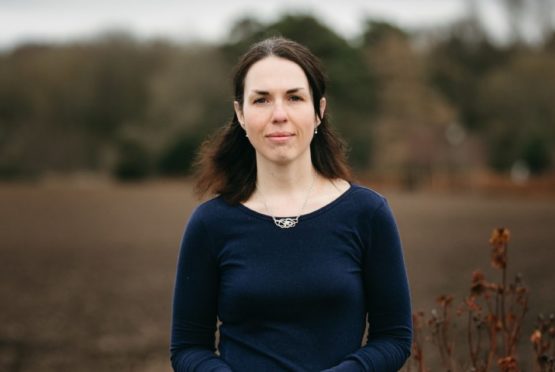
Young women are being denied early diagnosis of bladder cancer because of outdated guidelines discouraging referrals if they are under 45, experts warn.
Now women who have had to battle the cancer are campaigning for a change in the guidelines and greater awareness of the issue.
They are being backed by leading surgeons and a charity citing poorer survival from the cancer for women. Jaimin Bhatt, a consultant urologist at Queen Elizabeth University Hospital in Glasgow, says he is treating younger female patients than previously, some of whom had to push their GPs to refer them to hospital specialists.
His colleague Param Mariappan, of Edinburgh’s Western General Hospital, says he is also seeing more women in their 30s presenting with bladder cancer.
Cancer statistics show that women are less likely to get bladder cancer than men, but more likely to die from it due to late diagnosis.
Cancer Research UK says death rates are higher in Scotland than elsewhere in the UK. And although those rates are falling, they are dropping more slowly in women than in men.
Bhatt said: “The guidelines should be changed to include referrals of patients who have blood in their urine at any age.
“Some of my patients are in their 30s, have young children and want to live to see them grow up.
“Yet it is not unusual to see women below 45 with cancers, some of which have spread beyond the bladder wall and it is my impression that they are increasing in number. Most have been diagnosed after being mistakenly treated for recurrent infections.”
Even after the cancer is detected not all patients complete treatment within the ideal time for best recovery, said Mariappan.
NHS Scotland’s Treatment Time Guarantee insists that every health board must ensure patients receive in-patient and day case treatment within 12 weeks but the clock stops after the initial investigation and removal of the suspicious cancer site.
Mariappan said: “The route to vital follow-up treatment such as surgery to remove part or all of the bladder, or radiotherapy, is slow for some patients. It is not measured as part of the efficacy or effectiveness of the cancer’s full treatment.
“It falls short of NHS Scotland’s Quality Performance Indicator Programme where one of the demands stipulates that 90% of patients with muscle invasive bladder cancer should have either all or partial bladder removal or radiotherapy within 12 weeks of the diagnosis. The last three-year report suggests less than 80% of patients were treated within this timescale.”
The charity Fight Bladder Cancer says there has been an increase in younger women with the condition. Chief executive Dr Lydia Makaroff said: “Awareness of symptoms such as recurrent bladder infections and blood in the urine is vital for an early diagnosis.
“A three-month delay means a reduction of the 10-year survival rate of more than 14%.”
The Scottish Government said: “The guidelines support GPs’ judgment in identifying patients most likely to have cancer and require urgent assessment by a specialist.
“Treatment decisions will be made with the patient taking account of their preferences and balancing the harms and benefits involved based on the referral guidelines and clinical judgement.”
My plans to have children are over. I’m devastated
Rebecca Smith, 35, has lost the chance to have a baby after it took a year for her to be referred to a specialist.
Rebecca, a teacher from East Lothian, was finally sent to a urologist at Borders General where she was found to have bladder cancer.
She said: “I had pain, bleeding and exhaustion, which were put down to infections, most likely because guidelines to GPs discourage referrals to hospital specialists.
“Eventually my urine sample had so much blood in it that I was sent for hospital investigation. I had no idea that young women get bladder cancer as there is little awareness that it does happen in young people.
“The day of my investigation – a cystoscopy – my GP called me to say that I may have cancer. I was absolutely devastated because I had none of the risk factors. I don’t smoke, I exercise well and eat very healthily.
“My plans to become pregnant and have a child have been ended because treatment had to start so soon. There was no time to collect eggs to try for a baby in the future.
“Instead, I had to do everything to survive.”
Rebecca was referred to Edinburgh’s Western General for treatment and undergoes regular follow-up scans.
OPINION: Guidelines must be reviewed
Dr Lydia Makaroff, Chief executive, Fight Bladder Cancer
We have found half of all people diagnosed with bladder cancer had never heard of the condition.
Bladder cancer awareness is important, because early detection is likely to give you a far better outcome.
If you have blood in your pee, repeat urinary tract infections (UTIs), or pain when peeing, talk to your GP.
On average, every Scottish GP is likely to see two patients in their practice every year who have a new case of bladder cancer.
The Scottish Intercollegiate Guidelines Network tells GPs to refer men for urological investigation if they have a recurrent UTI that doesn’t respond to antibiotics.
But these guidelines don’t say to refer women to a specialist if they have the same symptoms.
The Scottish Primary Care Cancer Group only recommends urgent referral for people over 45 who have blood in their pee.
There is no mention of referral for any other symptom, such as pain when peeing or repeat UTIs, and no guidance for people with these symptoms who are aged under 45.
The Scottish Intercollegiate Guidelines Network and the Scottish Primary Care Cancer Group should review their GP referral guidelines to make sure that we are finding these people with bladder cancer before it’s too late.
Fight Bladder Cancer has a range of support and information resources to help anyone with suspected or confirmed bladder cancer.

Enjoy the convenience of having The Sunday Post delivered as a digital ePaper straight to your smartphone, tablet or computer.
Subscribe for only £5.49 a month and enjoy all the benefits of the printed paper as a digital replica.
Subscribe © Andrew Cawley
© Andrew Cawley © Supplied
© Supplied